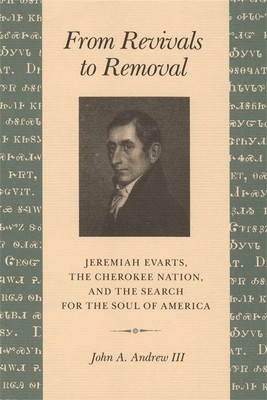
- We will send in 10–14 business days.
- Author: John a Andrew
- Publisher: University of Georgia Press
- ISBN-10: 082033121X
- ISBN-13: 9780820331218
- Format: 15.6 x 23.4 x 2.3 cm, softcover
- Language: English
- SAVE -10% with code: EXTRA
Reviews
Description
Between the end of the Revolutionary War in 1781 and Andrew Jackson's retirement from the presidency in 1837, a generation of Americans acted out a great debate over the nature of the national character and the future political, economic, and religious course of the country.
Jeremiah Evarts (1781-1831) and many others saw the debate as a battle over the soul of America. Alarmed and disturbed by the brashness of Jacksonian democracy, they feared that the still-young ideal of a stable, cohesive, deeply principled republic was under attack by the forces of individualism, liberal capitalism, expansionism, and a zealous blend of virtue and religiosity. A missionary, reformer, and activist, Jeremiah Evarts (1781-1831) was a central figure of neo-Calvinism in the early American republic. An intellectual and spiritual heir to the founding fathers and a forebear of American Victorianism, Evarts is best remembered today as the stalwart opponent of Andrew Jackson's Indian policies--specifically the removal of Cherokees from the Southeast. John A. Andrew's study of Evarts is the most comprehensive ever written. Based predominantly on readings of Evart's personal and family papers, religious periodicals, records of missionary and benevolent organizations, and government documents related to Indian affairs, it is also a portrait of the society that shaped-and was shaped by-Evart's beliefs and principles. Evarts failed to tame the powerful forces of change at work in the early republic, Evarts did manage to shape broad responses to many of them. Perhaps the truest measure of his influence is that his dream of a government based on Christian principles became a rallying cry for another generation and another cause: abolitionism.EXTRA 10 % discount with code: EXTRA
The promotion ends in 20d.06:28:06
The discount code is valid when purchasing from 10 €. Discounts do not stack.
- Author: John a Andrew
- Publisher: University of Georgia Press
- ISBN-10: 082033121X
- ISBN-13: 9780820331218
- Format: 15.6 x 23.4 x 2.3 cm, softcover
- Language: English English
Between the end of the Revolutionary War in 1781 and Andrew Jackson's retirement from the presidency in 1837, a generation of Americans acted out a great debate over the nature of the national character and the future political, economic, and religious course of the country.
Jeremiah Evarts (1781-1831) and many others saw the debate as a battle over the soul of America. Alarmed and disturbed by the brashness of Jacksonian democracy, they feared that the still-young ideal of a stable, cohesive, deeply principled republic was under attack by the forces of individualism, liberal capitalism, expansionism, and a zealous blend of virtue and religiosity. A missionary, reformer, and activist, Jeremiah Evarts (1781-1831) was a central figure of neo-Calvinism in the early American republic. An intellectual and spiritual heir to the founding fathers and a forebear of American Victorianism, Evarts is best remembered today as the stalwart opponent of Andrew Jackson's Indian policies--specifically the removal of Cherokees from the Southeast. John A. Andrew's study of Evarts is the most comprehensive ever written. Based predominantly on readings of Evart's personal and family papers, religious periodicals, records of missionary and benevolent organizations, and government documents related to Indian affairs, it is also a portrait of the society that shaped-and was shaped by-Evart's beliefs and principles. Evarts failed to tame the powerful forces of change at work in the early republic, Evarts did manage to shape broad responses to many of them. Perhaps the truest measure of his influence is that his dream of a government based on Christian principles became a rallying cry for another generation and another cause: abolitionism.

Reviews